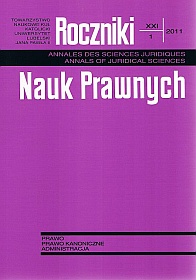Extension of the Repressive Function of Public Administration as a Threat to Democratic Legal Order
Abstract
The study is devoted to peculiar threats to the values of a democratic state arising in the process of creation and application of regulations regarding the activity of public administration. The regulations are linked with the evolution of the basic functions of state towards a new kind of administrative state whose characteristics resemble those of a police state. Two trends are analysed in the article. The first trend consists in a huge expansion of structures and scope of administrative policing (both as uniformed officials and “plain clothes” services and inspectors) and imposing on the police various tasks belonging to the domain of public administration, also those that could be realised by other administrative services in a more cost-effective and efficient manner, or simply tasks that should not be undertaken by state agencies. The second trend consists in granting administrative bodies new competences in the application of administrative measures, especially fines for infringement of obligations and prohibitions envisaged by acts of substantive administrative law. The article also gives examples of dysfunctional provisions which impose administrative sanctions, often generating extreme pathologies in their application. As a result, the policing function is becoming central and more often than not has a character of a repressive measure, while the effectiveness of personal legal protection against administrative abuses is being weakened. In such circumstances liberal institutions of a democratic legal state lose credibility, and the power of public authority and citizens’ trust in state agencies are decreasing.
The study points to acts through which the international community (Council of Europe in particular) is trying to impede the rise of such negative tendencies, and also emphasizes the potential impact of passing general regulations of administrative law. The draft regulations do not meet all expectations. The Author stresses the significance of normative (constitutional if possible) restriction on the permissibility of administrative sanctions. Their application should take place only if voluntary compliance cannot be obtained or if executive measures have failed. Those repressive measures which are inflicted in the court and the principle of guilt have fundamental roles.
Copyright (c) 2011 Roczniki Nauk Prawnych

This work is licensed under a Creative Commons Attribution-NonCommercial-NoDerivatives 4.0 International License.


